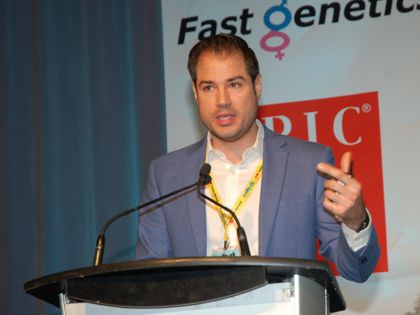"Maple Leaf sets goal to 'Raise the good in food"
Date posted: January 13, 2023
"To be the most sustainable protein company on earth."
A straightforward if ambitious objective. Some might say lofty.
Maple Leaf Foods' manager Mauricio Alanis told the 2023 Banff Pork Seminar that his company is doing more than talk about this goal. They are well down the road to reaching it, and to being able to prove what they've done.
The four pillars Maple Leaf uses are not surprising: Better food, better animal care, better planet, better people and community. Want to see how they're doing? Check out the company website, says Alanis, who is personally on the management frontlines of sustainability in Maple Leaf Foods.
His words come with pride of confident transparency. Everything the company has to say is available on that page available for all to see, he says.
Of particular pride is the Coller FAIRR ranking. FAIRR stands for Farm Animal Investment Risk and Return. Alanis says is the world's only assessment of meat, dairy and farmed fish producers on the material environmental, social and governance (ESG) risks. "We were ranked as the top pork and poultry producer in North America from a risk and opportunity perspective," he says.
A purpose driven company
Our purpose is to "Raise the Good in Food", says Alanis. Raise is an aspirational statement; it means to move forward and constantly improve. The "Good in Food" represents everything that is good about our business from what our food can deliver to society to what's in the food and what that means to the people that consume it.
Our purpose is why we exist as an organization, says Alanis. The Maple Leaf view is that the intersection between society's needs and who you are creates big bold opportunities. What the world needs and what your company is able to provide provides your purpose.
The backdrop to the Maple Leaf decision is the information much of society sees and believes. Rather than focus on debating the validity of that information Alanis made it clear this is the realty Maple Leaf considers. Agriculture accounts for 20 to 30 percent of the globe's greenhouse gas emissions. In the U.S. 80 percent of antibiotics used are for farm animals. There are 800 million people who do not have proper nutrition but 2 billion people are overweight. Of food produced 33 percent goes to waste. Fifteen of the 16 hottest years on record have happened in the 21 Century.
Better food
"We are actively addressing the most pressing diet-related health issues we face as a society, including reducing artificial ingredients, antibiotics use and continually advancing leadership in food safety," says Alanis.
Maple Leaf's sustainable meat principles are a clear indication of the new company. Goal is food that is nutritious, healthy and safe, produced through a resilient, fair and efficient food system that makes optimal use of land and natural resources.
It comes from animals raised with care, with minimal use of antibiotics and to standards that respect the five freedoms of animal welfare. Is produced with environmental standards that measurably reduce impacts across the cycle, limiting greenhouse emissions and impacts on water quality and quantity, avoiding loss of biodiversity and eliminating waste.
Maple Leaf has developed a sophisticated carbon tracking system, doing a deep dive into understanding their carbon inventory. Leadership in the highest standard of animal care is a social and ethical priority. For example, in 2007, Maple Leaf was the first major company in Canada to commit to converting sows from gestation crates to open sow housing. By 2021, all owned sow spaces had been converted.
Strengthening communities.
How that value is captured in communities is a key part of the Maple Leaf strategy.
There are 5.8 million Canadians or roughly16 percent of households facing food insecurity, Alanis told Seminar delegates. One in five children lives in food-insecure households.
Maple Leaf has a comprehensive plan for leadership within and outside the company and Alanis believes company performance showcases their success. They have donated more than $3 million of healthy products and food relief and committed over $8 million to 24 initiatives across Canada to-date to advance food security.
Inside the company, they now have 39 percent women representation at the manager level and above, and company safety record is strong.
Looking ahead
One of the greatest challenges for the agricultural industry is to meet the increasing global demand for food while dramatically decreasing the environmental footprint of food production, says Alanis. Two major spotlights for the future for Maple Leaf Foods are anaerobic and regenerative agriculture.
All of the manure produced at company operations is applied to the land as fertilizer but Alanis says the company realized how much methane was being produced from manure in storage lagoons.
They are now aggressively investing in anaerobic digesters to reduce emissions and capture advances in their operations and supply chains. It's an undeveloped market in North America, which has fewer than 500 digesters across the continent while Germany alone, by comparison, has 10,000.
In 2019 Maple Leaf became the world's first carbon neutral food company. Organizations managing carbon emissions typically start by avoiding intensive activities, then reducing or replacing carbon sources, and finally offsetting emissions that cannot be reduced.
Alanis believes the company has solid growth ahead based on these principles.
BPS delegates had some questions for Alanis about the company goals and what it means for the pork industry. They and all of society interested will follow the company journey with interest.
Return to the News Release Index

